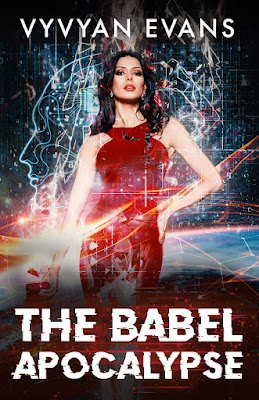~~~~~~~~~~~~~
BLURB:
Language is no longer learned, but streamed to neural implants regulated by lang-laws. Those who can't afford language streaming services are feral, living on the fringes of society. Big tech corporations control language, the world’s most valuable commodity.
But when a massive cyberattack causes a global language outage, catastrophe looms.
Europol detective Emyr Morgan is assigned to the case. His prime suspect is Professor Ebba Black, the last native speaker of language in the automated world, and leader of the Babel cyberterrorist organization. But Emyr soon learns that in a world of corporate power, where those who control language control everything, all is not as it seems.
As he and Ebba collide, Emyr faces an existential dilemma between loyalty and betrayal, when everything he once believed in is called into question. To prevent the imminent collapse of civilization and a global war between the great federations, he must figure out friend from foe—his life depends on it. And with the odds stacked against him, he must find a way to stop the Babel Apocalypse.
The Babel Apocalypse earned a starred review in Kirkus: "A perfect fusion of SF, thriller, and mystery—smart speculative fiction at its very best."
The full review is here: https://www.kirkusreviews.com/book-reviews/vyvyan-evans/the-babel-apocalypse-songs-of-the-sage/
Book website (including ‘Buy’ links): www.songs-of-the-sage.com
~~~~~~~~~~~~~
EXCERPT:
Ebba was all too aware that she was viewed as an anomaly by pretty much everyone; she was neither feral nor out-soc. So, some of her students—especially those from outside the Republic, such as the Grand Union, and other places too—thought she must be breaking the law. It was a common misconception. She had even once been reported to the authorities by one of those types. For being an unchipped ghost, as they called her. That made her laugh; a dark laugh at the irony of it. The mutes, she called them. Those who had been fitted with Universal Grammar tech.
But while she officially resided in the Nordic Republic, and as long as she remained there, Ebba wasn’t doing anything illegal. The Republic was something of a curiosity even among Tier One states, never having passed a lang-law. Yet this singular absence was offset by the special requirements of Nordic birth licenses. To have one granted, prospective parents had to consent to their newborn being fitted with Universal Grammar tech. So everyone got a language chip at birth anyway, together with an ear implant transceiver. Which meant that voice command tech was, for all intents and purposes, de rigueur even without a lang-law. But that was the Scandinavian way. In the Nordic Republic, they organized freedom.
For her part, Ebba knew it wasn’t her. It was everyone else who had the problem. “That’s what you would think,” her braver, typically male students told her. “You’re Ebba Black.” Ha! Whatever that means. How do they know what Ebba Black would think anyway?
~~~~~~~~~~~~~
Author Bio:
.jpg)
Dr. Vyvyan Evans is a native of Chester, England. He holds a PhD in linguistics from Georgetown University, Washington, D.C., and is a Professor of Linguistics. He has published numerous acclaimed popular science and technical books on language and linguistics. His popular science essays and articles have appeared in numerous venues including 'The Guardian', 'Psychology Today', 'New York Post', 'New Scientist', 'Newsweek' and 'The New Republic'. His award-winning writing focuses, in one way or another, on the nature of language and mind, the impact of technology on language, and the future of communication. His science fiction work explores the status of language and digital communication technology as potential weapons of mass destruction.
Author Links:
Author website: https://www.vyvevans.net/
Youtube channel: https://www.youtube.com/@vyvevans
Twitter:https://twitter.com/VyvEvans
Facebook: https://www.facebook.com/Vyvyan.Evans.Author
Instagram:https://www.instagram.com/nephilim_publishing/
~~~~~~~~~~~~~
Does your profession make it easier, or harder, when you're developing a book?
My background is in linguistics and cognitive science—I have a PhD in linguists and have spent a career working as a university professor of linguistics.
I think that whatever the genre of writing, there are specific challenges, as well as some broad similarities. I have written and published technical books on language and mind, works of reference such as glossaries and textbooks, as well popular science books. Each of these genres requires a different style of presentation. But the commonality is that the writing style is expository: the message is key, and that must be explained clearly in an audience-specific way, whether writing for students, interested lay-readers of language and science, or seasoned academic experts.
In terms of writing genre fiction (such as science fiction), the key difference is that the message emerges through the story. Hence, the exposition (of a more academic style) takes a backseat. In genre fiction, as the messages derive from (and through) the story, which is the central driver of fiction, the aphorism ‘show, don’t tell’ becomes key.
I find science fiction to be appealing as a genre, as it really is an advantage to be a subject matter expert. To write convincingly, especially in so-called ‘hard’ science fiction, such as The Babel Apocalypse, which strives for scientific accuracy, it is important to have relevant background in the story and the ideas being conveyed. And it seems to me that this cannot be adequately replicated without some meaningful level of expertise.
Isaac Asimov, for instance, one of the genre’s early pioneers, was a Professor of Biochemistry at Boston University, also possessing a background in physics and mathematics. In short, it’s important to write what you know. And from that perspective, it was a relatively easy step to move from writing about language for a technical audience to writing about the future of language for a speculative fiction audience.
~~~~~~~~~~~~~
GIVEAWAY:
The author will be awarding a physical paperback copy of the book (available internationally) to a randomly drawn commenter.


Thanks for hosting!
ReplyDelete